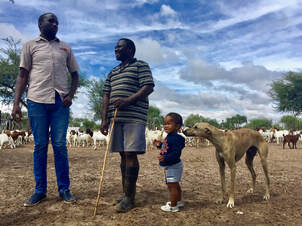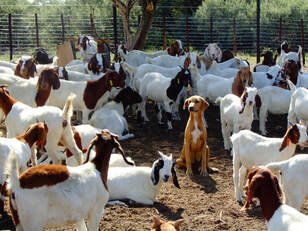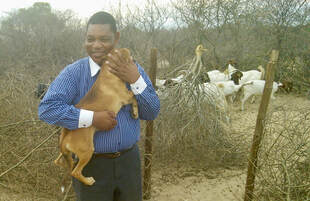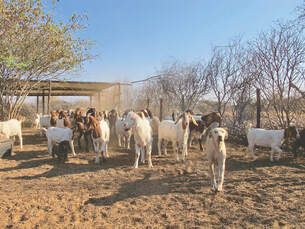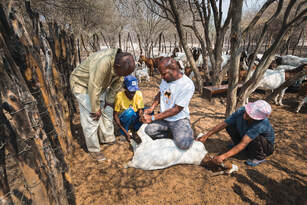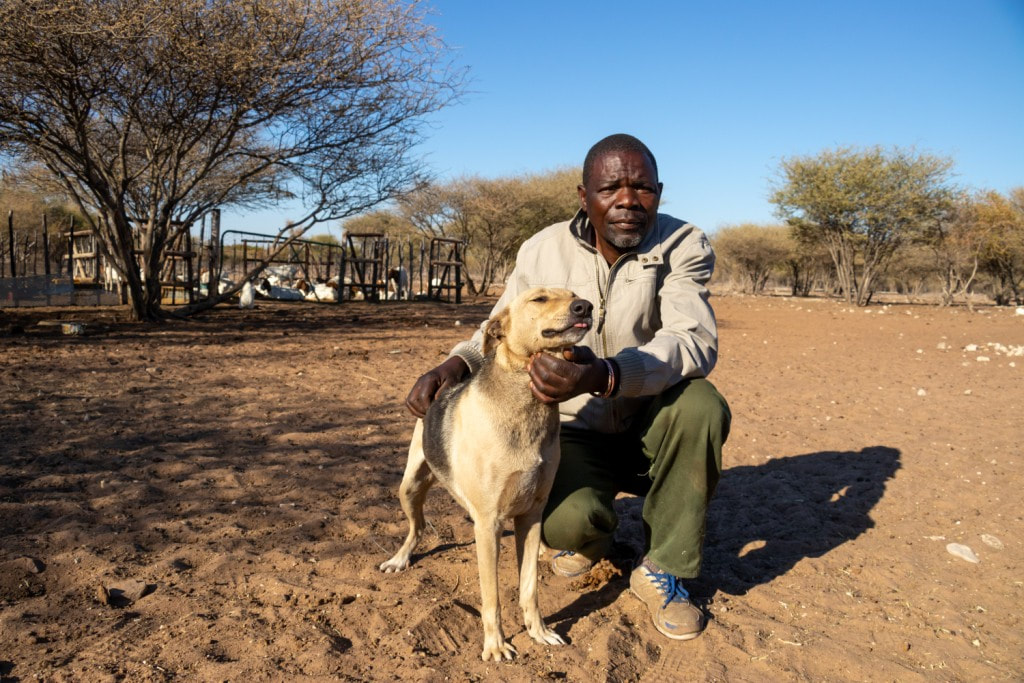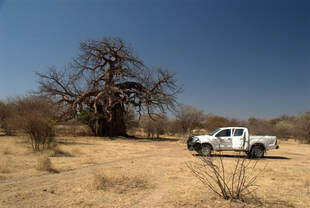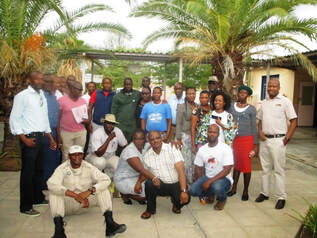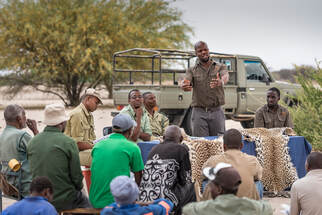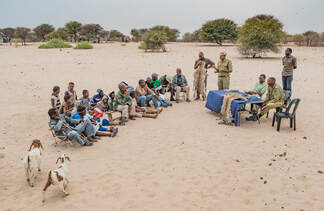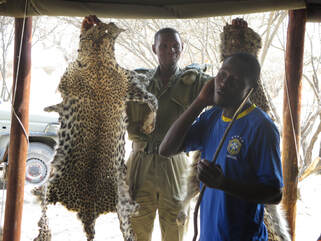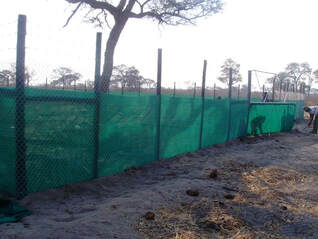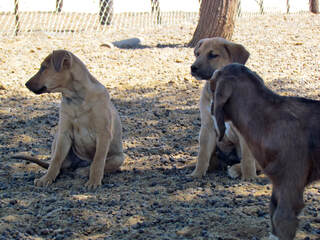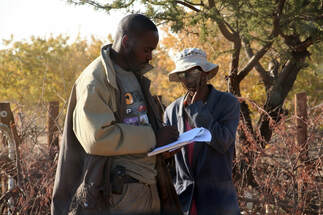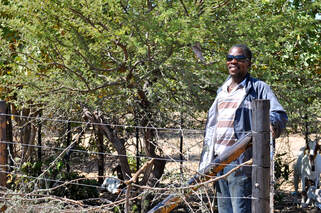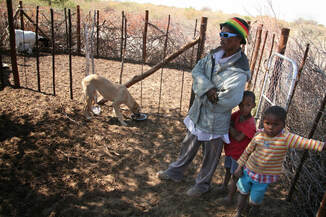FARMING FOR CONSERVATION
|
Despite their status as a global icon and evolutionary marvel, many farmers who share the land with cheetahs often consider these animals as pests due to the perceived threat that they cause to their livestock. Working with farmers, CCB aims to instill a respect and an understanding of the role carnivores play in the ecosystem while helping to assist farmers to protect their livestock from predation. Through CCB’s "Farming for Conservation" program, CCB is trying to help farmers implement inexpensive carnivore control methods to curb losses, improve productivity and therefore improve livelihoods.
|
Current Projects
|
Livestock Guarding Dog Program Livestock guarding dogs (LGDs) are dogs that are raised with livestock and instinctually protect them from threats such as carnivores and thieves. CCB has conducted groundbreaking research in promoting the use of local Tswana dogs as the first line of defence against carnivores. This local breed has proven to be very effective at protecting livestock from carnivores if monitored properly and kept in good health. CCB provides free veterinary care for LGDs and support for the farmers who use them in Botswana, and CCB has a network of over 100 active LGD owners who receive newsletters, free veterinary care for their dogs, promotional materials and information about current LGD research and any other upcoming events. We also use our demonstration farm as a training site for LGD puppies, which are trained at our facility and then placed with farmers who are experiencing conflict with cheetahs. Since its inception in 2013, our LGD placement program has placed over 130 LGDs to farmers in need and we continue to monitor all active dogs in the programme to assess the effectiveness of this intervention. Demonstration Farm CCB's Ghanzi Camp is home to our demonstration farm, which is a site where we can showcase farm management methods that are environmentally-friendly, including those that will protect livestock from livestock predation. The farm is used to give practical demonstrations to attendees at our farmers workshops and bush camps so that they can see in practice how these techniques work. Techniques on show at the farm include livestock guarding dogs, herders, a carnivore-proof kraal (livestock enclosure), once-yearly breeding seasons, good livestock health care and good record keeping. At the site, farmers can learn a variety of farm management techniques including goat hoof trimming, how to vaccinate a LGD and how to place thorn bush around a kraal to prevent leopards from entering, among other things. Model Farmers Through our work with our farmers' networks, CCB have identified a handful of inspirational farmers whose work improving their own farms has helped them to greatly reduce their predation and improve the sustainability of their farming enterprises. We are working with these model farmers so that they can increase their ability to teach others within their community on the importance of sustainable farming, including coexisting with carnivores. We have also trained our model farmers in the care and training of livestock guarding dogs so that they can assist us in training LGD puppies for placement with farmers in need. Thanks to this development, we have increased exponentially the number of livestock guarding dogs that we can place. This allows us to keep up with the vivacious demand for livestock guarding dogs in our target areas. Rapid Response Unit CCB's farmer outreach team is on call 24/7 to respond to calls of assistance from farmers experiencing conflict with cheetahs. The team will respond to conflict calls through direct site visits that are made to cattleposts, farms and villages to discuss farmers’ carnivore problems and explore non-lethal methods of carnivore control. During each site visit, information is collected to assess carnivore presence, extent of conflict and community perceptions. CCB’s farming for conservation team helps farmers come up with solutions to their problems by assessing which carnivores are causing problems and how best the farmer can change his management to protect his livestock from the predation. User-friendly reading materials are also given out to farmers and stakeholders to read for themselves and use in the future. Farmers that are experiencing conflict can contact CCB on +267 651 1596 for a site visit to be arranged. Farmers Networks CCB established Farmers Networks in the Southern and Ghanzi Districts in order to facilitate the exchange of information between farmers to benefit the productivity on their farms. By sharing experiences and tools and techniques to improve their farming, farmers are inspired to develop their farms in ways that improve productivity. This often includes advances in range management and carnivore control, but also includes other issues such as administration and finance. CCB facilitates exchange visits amongst the members, capacity building training and produces regular newsletters with up to date information about the farming industry in Botswana. Members of the Southern Livestock Farmers Network (SOLIFANE) and the Ghanzi Small Stock Farmers Network (GFN) are also beneficiaries of our LGD placement program. Farmers Workshops Residential and mobile farmers’ workshops are a way in which CCB can provide information and training to farmers who may come into conflict with carnivores. These workshops provide training in best practices, information sharing and networking within the community. Topics covered during the workshops include the importance of carnivores, correct identification of livestock loss, reducing livestock loss to carnivores and the training and use of livestock guarding animals. CCB also encourages farmers to use best practice when managing their farms – this includes having carnivore proof kraals, herders that go out with animals, appropriate monitoring of the stock numbers and condition, good herd health and thorough record keeping. CCB holds farmers workshops at regional centers, as well as at our education centers in Ghanzi. Each participant receives a Carnivore Resource Pack with great resources to assist farmers with assessing livestock losses and implementing appropriate mitigation methods. Poaching and Illegal Trade Highlighting the issues of poaching, illegal trade and standing up against wildlife crimes is another way in which CCB protects cheetahs. Sadly, poaching and illegal trade still occur in Botswana as well as throughout Africa. Through providing relevant information to governments to assist in improving legislation, strengthen policing and increase penalties for wildlife crimes as well as through educating the community, CCB hopes to help put an end to such activities that threaten the survival of this species. |
Previous Projects
|
Northern Botswana Human Wildlife Coexistence Project
In conjunction with the World Bank and the Department of Wildlife and National Parks, CCB collaborated on a project in northern Botswana between 2010 and 2015 to monitor farmers and their conflict with carnivores. Twenty-six farmers from the Okavango, Boteti and Chobe districts were selected after being identified as being particularly vulnerable to problems with lions, leopards and cheetahs. The attitudes of these farmers to carnivores and conservation and the productivity of their farms are being monitored during a process that involves environmental education and the receipt of carnivore-proof livestock corrals (kraals) or livestock guarding dogs. This research aims to identify whether these mitigation techniques are effective at reducing livestock losses to carnivores and whether they are improving farmers’ perception of carnivores and conservation efforts. Information gained from this study will have significant ramifications for similar projects taking place throughout Africa, and it signifies a big step towards the coexistence between Botswana’s farmers and the unique wildlife with which they live alongside. Study into Carnivore Conflict in the Kalahari Between 2008 and 2014 CCB’s Farming for Conservation staff alongside our Research Department conducted over 300 farmers surveys along the entire western Kalahari region. The results of which were analysed and published by our very own Executive Director Rebecca Klein as her Masters thesis. The result was an in depth analysis of human-wildlife conflict in the Kalahari, the details of which had never been seen before. The study focused on how Kalahari farmers lived and farmed alongside some of Africa’s most formidable carnivores, including cheetahs, what factors made them more susceptible to conflict and what techniques they were using that were helping to relieve conflict. The results from this work have helped shaped the approach CCB has taken since the results were published and we are forever grateful to those who were involved in making this study a reality — especially the farmers. Long Term Conflict Mitigation in Kacgae From 2011 until 2014 CCB undertook a comprehensive programme with the farmers of Kacgae – an isolated village within one of Botswana’s most important wildlife corridors. Earmarked as a hot spot for human-wildlife conflict, CCB staff engaged with the farmers there and worked alongside the community to develop a programme that saw farmers using mitigation methods to protect their livestock. The long-term monitoring that we undertook revealed a surprisingly high attrition rate in the programme, with only three farmers having functional kraals at the end of the study period and only one LGD actively protecting its herd by the end of the three-year period. What we have learned from this is that the uptake of ideas and use of tools provided will likely not be sustained long-term unless there is financial buy-in from the farmers themselves and the planning process has more of a bottom-up approach. The one major lesson that we will take home from this experience is the great importance of long-term monitoring — a tool that is now standard for all of our interventions. |

